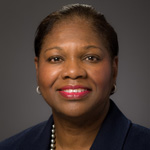Hamline’s future president: Dr. Fayneese Miller

Dr. Miller will be instated as President on July 1, 2015.
May 12, 2015
Fayneese Miller was announced President of Hamline University early last month, but she doesn’t officially take office until July 1. For Miller this gap is filled with interviews, meetings and countless emails. These are the demands of laying an early foundation for her stay in St. Paul.
“It’s surreal,” Miller said from the Red Wing Room at Anderson Hall, “I haven’t wrapped my arms around it yet. You have all of this work that you do in your current position and none of it stops, none of it has slowed down. I’ve spent days going through emails, and I haven’t missed one. I may have missed one or two, but other than that not one.”
That current position is as dean of the College of Education and Social Services and professor of leadership and developmental sciences at the University of Vermont. Over her ten year career at UVM, her college shot up in academic rankings while she steadily improved their budget through financial stewardship and strong fundraising. She’s also displayed a commitment to racial justice through scholarship as well as administration.
In 2005 Miller first arrived at UVM and spoke about the benefits of social and political involvement for promoting cross-racial relationships on campus. This becomes doubly relevant when noting that Miller is the first black woman ever elected to Hamline’s highest office. However much pressure Miller may be under, she’s seen this all before.
“It’s not negative pressure, but I need to tell you,” Miller explained, “I was the first black female to get a Ph.D. at TCU, I was the first black woman to achieve tenure at Brown University, and I was the first black female dean at the University of Vermont so that is something I wanted to make clear and I asked Hamline to clearly articulate that when they announced me as the next President. I think we should celebrate Hamline for having the courage to select someone like me, and the faith that I was qualified and capable to hold this position.”
She continued:
“I’m a child of the Civil Rights movement. My hometown, Danville, VA is seen by many as the last seat of the Confederacy. When I was growing up, segregation had already been eliminated (or on its way out) but the [white] citizens of that community were very reluctant to accept it.”
One of seven children, this upbringing helped mold Miller into an excellent student who took every opportunity to enjoy herself, especially while in college.
“I loved dancing as an undergrad. I had very good grades, but I took advantage of every opportunity my school gave me to enjoy it. I like seeing students enjoy themselves; there should be more of that.”
Dancing notwithstanding, Miller has a few other priorities in mind as she begins her tenure. At the heart of her administrative plan lie strategic and forward-leaning goals that Miller believes will position Hamline as a first-choice institution.
“One thing I’m interested in is enrollment, now and in the future. How are we growing, and how are we creating curricula that is attracting more students?” Miller said.
“Another is fiscal health; how can we maintain a financial situation so that we can do kinds of things we want to do? Things like scholarships for students, endowed faculty positions are needed. I want to make sure that we are doing enough of the right things to support our veteran community. And we also need to be more involved with the community colleges. We need to refine our articulation agreements so that students feel like they are welcomed at Hamline if they are coming from a local community colleges.”
These are relevant issues that Hamline has been trying to improve. Many community college students lose semesters of credit transferring to Hamline. Better transfer credit articulations will help students pick up and go once they arrive on campus, graduating on time and saving money in the process. Endowed faculty positions help free up salaries to pay adjunct professors and other non-tenured staff, retaining talented educators who grow on campus.
Miller has her work cut out for her when she finally takes office this summer. Lifting a university campus to new heights while trying to improve race relations is a tall order. She always takes time to read and is an avid reader of poetry. In spite of all the strategic and political plans and ideas she has, the Langston Hughes fan keeps it relatively simple.
She said:
“The more we educate our people, the more we will be able to recognize our differences and realize that our differences make us stronger, not weaker.”

